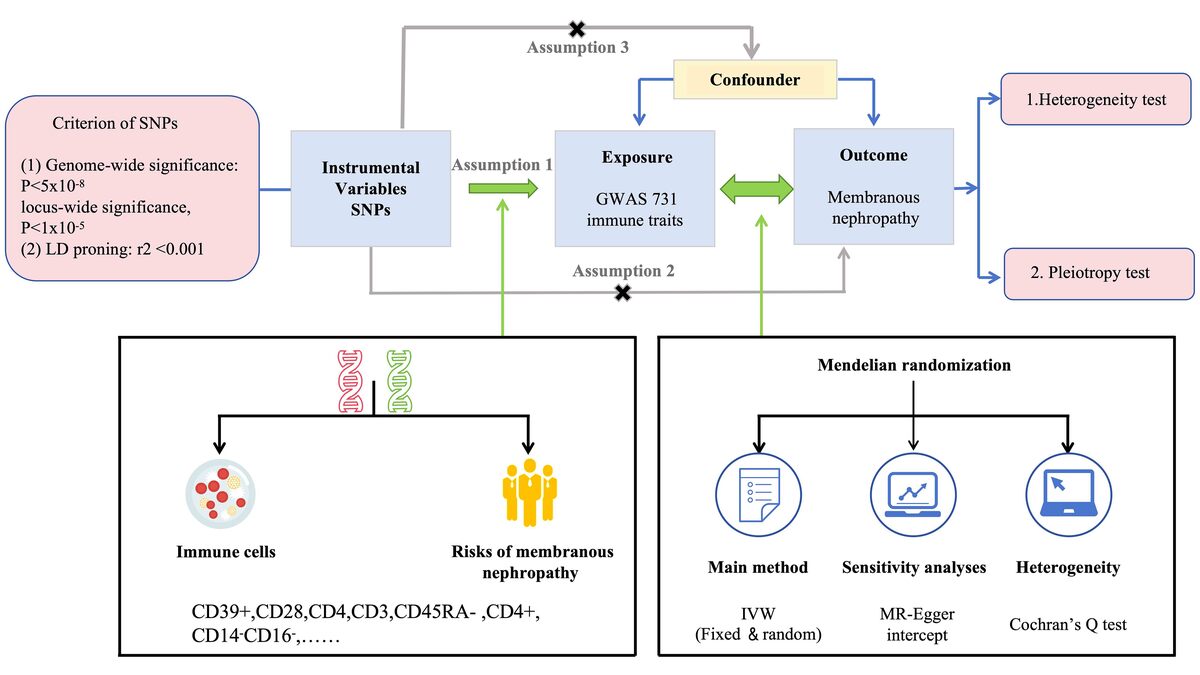Current issue
Archive
Manuscripts accepted
About the Journal
Editorial office
Editorial board
Section Editors
Abstracting and indexing
Subscription
Contact
Ethical standards and procedures
Most read articles
Instructions for authors
Article Processing Charge (APC)
Regulations of paying article processing charge (APC)
NEPHROLOGY / RESEARCH PAPER
Association between immune cells and membranous nephropathy: a two-sample Mendelian randomization study
1
Research Centre of Basic Integrative Medicine, School of Basic Medical Sciences, Guangzhou University of Chinese Medicine, China
2
Zhongshan School of Medicine, Sun Yat-sen University, Ministry of Education, China
3
Department of nephrology,Hangzhou Ninth People's Hospital, China
These authors had equal contribution to this work
Submission date: 2024-07-15
Final revision date: 2024-10-02
Acceptance date: 2024-10-19
Online publication date: 2024-10-26
Corresponding author
KEYWORDS
Single nucleotide polymorphismMendelian randomizationImmune cellsMembranous nephropathyGenome-wide association studies
TOPICS
ABSTRACT
Introduction:
Multiple studies have indicated that immune cells play a significant role in the occurrence and development of membranous nephropathy (MN). However, the causal relationship between the two has not been fully established. To further investigate this, we employed a Mendelian randomization (MR) study design.
Material and methods:
Genetic instrumental variables for immune cells were sourced from an extensive genome-wide association study (GWAS). MN summary statistics, involving 2,150 cases and 5,829 controls, were obtained from a separate GWAS. The primary analysis employed the inverse-variance weighted (IVW) method. To explore reverse causation, a reverse MR analysis was undertaken. Rigorous sensitivity analyses were conducted to ensure the resilience and reliability of the study's findings.
Results:
We identified eight immunophenotypes associated with a reduced risk of MN and all of them were the protective factors for MN. The sensitivity analyses consistently yielded similar results for these immune traits. In the reverse MR analysis, we did not observe any statistically significant associations between MN and these eight immunophenotypes.
Conclusions:
Our study, utilizing genetic approaches, provides evidence for a causal relationship between immune cells and MN, which has implications for clinical diagnosis and treatment. Further comprehensive investigations are needed to explore the detailed mechanisms underlying the impact of immune cells on MN.
Multiple studies have indicated that immune cells play a significant role in the occurrence and development of membranous nephropathy (MN). However, the causal relationship between the two has not been fully established. To further investigate this, we employed a Mendelian randomization (MR) study design.
Material and methods:
Genetic instrumental variables for immune cells were sourced from an extensive genome-wide association study (GWAS). MN summary statistics, involving 2,150 cases and 5,829 controls, were obtained from a separate GWAS. The primary analysis employed the inverse-variance weighted (IVW) method. To explore reverse causation, a reverse MR analysis was undertaken. Rigorous sensitivity analyses were conducted to ensure the resilience and reliability of the study's findings.
Results:
We identified eight immunophenotypes associated with a reduced risk of MN and all of them were the protective factors for MN. The sensitivity analyses consistently yielded similar results for these immune traits. In the reverse MR analysis, we did not observe any statistically significant associations between MN and these eight immunophenotypes.
Conclusions:
Our study, utilizing genetic approaches, provides evidence for a causal relationship between immune cells and MN, which has implications for clinical diagnosis and treatment. Further comprehensive investigations are needed to explore the detailed mechanisms underlying the impact of immune cells on MN.
Share
RELATED ARTICLE
We process personal data collected when visiting the website. The function of obtaining information about users and their behavior is carried out by voluntarily entered information in forms and saving cookies in end devices. Data, including cookies, are used to provide services, improve the user experience and to analyze the traffic in accordance with the Privacy policy. Data are also collected and processed by Google Analytics tool (more).
You can change cookies settings in your browser. Restricted use of cookies in the browser configuration may affect some functionalities of the website.
You can change cookies settings in your browser. Restricted use of cookies in the browser configuration may affect some functionalities of the website.



